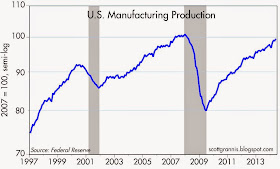U.S. industrial production in May increased more than expected, and there were upward revisions to prior months. Production is up at a 4.6% annualized rate in the six months ended May, and it hasn't been much stronger in the current recovery. The level of industrial production is now well into new, all-time high territory. The Eurozone is still struggling, but making progress nonetheless. Given the very low level of inflation in the Eurozone, its understandable that the ECB feels the need to increase its monetary policy accommodation, but it's arguable whether still-lower interest rates are going to boost economic growth significantly. Both the Eurozone and the U.S. economy would benefit more from growth-friendly fiscal policies than from zero interest rates.
Manufacturing production rose at a 3.9% annualized pace over the past six months, and is up 3.5% in the past year. You could complain that manufacturing production has yet to reach a new high, but it is undeniably the case that there has been a significant and ongoing recovery. From the market's perspective, it's all about changes on the margin, not the level of production.
With the economy continuing to grow but short-term interest rates still priced to a recession or worse, it seems inevitable that the prices of risk assets will continue to rise, since their yields are significantly higher than the yield on cash. The story of this recovery has been the same for the past five years: although the recovery has been disappointingly slow, the economy has nevertheless recovered, and it has consistently performed better than the market's rather pessimistic expectations.




Not sure that the Fed should worry about its balance sheet...Cochrane/Chicago says it could even be larger as long as interest on excess reserves is paid...Fed still well below an average 2 percent PCE inflation target...could run at 2.5 percent PCE to balance things out but probably will not...looks like many years of very low interest rates ahead...
ReplyDelete